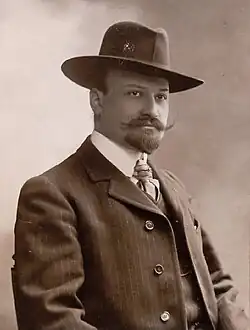Camille Erlanger

Camille Erlanger (25 May 1863 – 24 April 1919) was a French opera composer. He studied at the Paris Conservatory under Léo Delibes (composition), Georges Mathias (piano), as well as Émile Durand and Antoine Taubon (harmony).[1] In 1888 he won the Prix de Rome for his cantata Velléda. His most famous opera, Le Juif polonais, was produced at the Opéra-Comique in 1900.
Erlanger died in Paris and was buried in the Père Lachaise Cemetery.[2]
A street in Quebec City, Avenue Erlanger, is named after Erlanger.[3]
The opera L'Aube rouge was revived at the Wexford Festival (2023) directed by Guillaume Tourniaire and Christophe Manien.[4] Broadcast in November on Raidió Teilifís Éireann and BBC Radio 3.
A concert version of La Sorcière was given on December 12, 2023 in Geneva's Victoria Hall, again conducted by Guillaume Tourniaire.,[5] and was recorded for a CD on the B.records label, released on October 4, 2024:[6]
Works

- Velléda, scène lyrique (1888), given at the Concerts Colonne in 1889
- La Légende de Saint-Julien l'Hospitalier, légende dramatique in three acts and seven tableaux, after the story by Gustave Flaubert, (1888)
- Kermaria, drame lyrique in three acts, libretto by Pierre-Barthélemy Gheusi, Opéra-Comique 8 February 1897
- Faublas, libretto by Pierre-Barthélemy Gheusi, 1897
- Le Juif polonais, after a novel by Erckmann-Chatrian, Opéra-Comique, 11 April 1900
- Le Fils de l'étoile, drame musical in five acts, libretto by Catulle Mendès, 20 April 1904, Palais Garnier
- La Glu, drame lyrique after the novel by Jean Richepin
- Aphrodite, drame musical in five acts and seven tableaux after the novel by Pierre Louÿs, adaptation by Louis de Gramont, 23 (or 27 ?) March 1906, Opéra-Comique
- Bacchus triomphant, 11 September 1909, Bordeaux
- L'aube rouge, 29 December 1911, Rouen
- Hannele Mattern, rêve lyrique in five acts (1911), libretto by Jean Thorel and Louis-Ferdinand de Gramont (1854–1912) after the drama Hanneles Himmelfahrt by Gerhart Hauptmann, 28 January 1950, Strasbourg (Opéra du Rhin)
- La Sorcière, 18 December 1912, Paris
- Le Barbier de Deauville, 1917
- La Forfaiture, 1921, Paris
La Forfaiture, based on the 1915 film The Cheat, is the first opera to be based on a film scenario.[7]
Notes
- ^ Jacobshagen, Arnold: "Erlanger, Camille", in: Die Musik in Geschichte und Gegenwart (MMG), biographical part, vol. 6 (Kassel: Bärenreiter, 2001; ISBN 3-7618-1116-0), cc. 437.
- ^ Bauer, Paul (2006). Mémoire et Documents (ed.). Deux siècles d'histoire au Père Lachaise. Mémoire & documents. p. 316. ISBN 978-2914611480.
- ^ "Fiche descriptive : Avenue Erlanger". Commission de toponymie du Québec. Retrieved 29 January 2018.
- ^ [1] Wexford Opera
- ^ [2]: "La Sorcière, Camille Erlanger's forgotten opera, is reborn in Geneva", on rts.ch, December 12, 2023
- ^ [3] on Forum Opéra.
- ^ Miyao, D. (2007). Sessue Hayakawa: Silent Cinema and Transnational Stardom. Duke University Press. p. 25. ISBN 978-0-8223-3969-4. Retrieved 24 May 2022.
References
- Forbes, Elizabeth (1992), 'Erlanger, Camille' in The New Grove Dictionary of Opera, ed. Stanley Sadie (London) ISBN 0-333-73432-7
External links